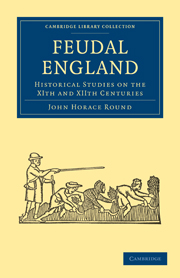Book contents
- Frontmatter
- Preface
- Contents
- PART I TERRITORIAL STUDIES
- PART II HISTORICAL STUDIES
- NORMANS UNDER EDWARD THE CONFESSOR
- MR. FREEMAN AND THE BATTLE OF HASTINGS
- MASTER WACE
- NOTE ON THE PSEUDO-INGULF
- REGENBALD, PRIEST AND CHANCELLOR
- THE CONQUEROR AT EXETER
- THE ALLEGED DESTRUCTION OF LEICESTER (1068)
- ELY AND HER DESPOILERS (1072–75)
- THE LORDS OF ARDRES
- EARLY IRISH TRADE WITH CHESTER AND ROUEN
- WALTER TIREL AND HIS WIFE
- WALDRIC, WARRIOR AND CHANCELLOR
- A CHARTER OF HENRY I. (1123)
- THE ORIGIN OF THE NEVILLES
- THE ALLEGED INVASION OF ENGLAND IN 1147
- THE ALLEGED DEBATE ON DANEGELD (1163)
- A GLIMPSE OF THE YOUNG KING'S COURT (1170)
- THE FIRST KNOWN FINE (1175)
- THE MONTMORENCY IMPOSTURE
- THE OXFORD DEBATE ON FOREIGN SERVICE (1197)
- RICHARD THE FIRSTS CHANGE OF SEAL (1198)
- COMMUNAL HOUSE DEMOLITION
- THE CINQUE PORT CHARTERS
- ADDENDA
- INDEX
RICHARD THE FIRSTS CHANGE OF SEAL (1198)
Published online by Cambridge University Press: 05 October 2010
- Frontmatter
- Preface
- Contents
- PART I TERRITORIAL STUDIES
- PART II HISTORICAL STUDIES
- NORMANS UNDER EDWARD THE CONFESSOR
- MR. FREEMAN AND THE BATTLE OF HASTINGS
- MASTER WACE
- NOTE ON THE PSEUDO-INGULF
- REGENBALD, PRIEST AND CHANCELLOR
- THE CONQUEROR AT EXETER
- THE ALLEGED DESTRUCTION OF LEICESTER (1068)
- ELY AND HER DESPOILERS (1072–75)
- THE LORDS OF ARDRES
- EARLY IRISH TRADE WITH CHESTER AND ROUEN
- WALTER TIREL AND HIS WIFE
- WALDRIC, WARRIOR AND CHANCELLOR
- A CHARTER OF HENRY I. (1123)
- THE ORIGIN OF THE NEVILLES
- THE ALLEGED INVASION OF ENGLAND IN 1147
- THE ALLEGED DEBATE ON DANEGELD (1163)
- A GLIMPSE OF THE YOUNG KING'S COURT (1170)
- THE FIRST KNOWN FINE (1175)
- THE MONTMORENCY IMPOSTURE
- THE OXFORD DEBATE ON FOREIGN SERVICE (1197)
- RICHARD THE FIRSTS CHANGE OF SEAL (1198)
- COMMUNAL HOUSE DEMOLITION
- THE CINQUE PORT CHARTERS
- ADDENDA
- INDEX
Summary
With the superficial student and the empiric politician, it is too common to relegate the investigation of such changes to the domain of archaeology. I shall not attempt to rebut the imputation ; only, if such things are archaeology, then archaeology is history.–Stubbs, Preface to R. Hoveden, IV., lxxx.
HISTORICAL research is about to pass, if indeed it is not already passing, into a new sphere–the sphere of Archælogy. The central idea of that great advance which the present generation has witnessed in the domain of history has been the rebuilding of the historical fabric on the relatively sure foundation of original and contemporary authorities, studied in the purest texts. Chronicles, however, are not inexhaustible: for many periods they are all too few. The reaper has almost done his work; the turn of the gleaner has come. The smaller quellen of history have now to be diligently examined and made to yield those fragments of information which will supplement, often where most needed, our existing stock of knowledge.
But this is not our only gain as we leave the broad highways trodden by so many before us. Those precious fragments which are to form our spoils will enable us to do more than supplement the statements of our standard chroniclers: they will afford the means of checking, of testing, by independent evidence, these statements, of submitting our witnesses to a cross-examination which may shake their testimony and their credit in a most unexpected manner.
- Type
- Chapter
- Information
- Feudal EnglandHistorical Studies on the XIth and XIIth Centuries, pp. 539 - 551Publisher: Cambridge University PressPrint publication year: 2010First published in: 1895

